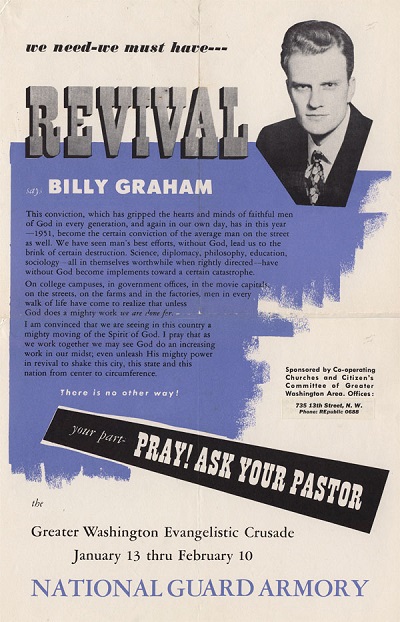By Bob Allen
Today’s National Day of Prayer is a constitutionally suspect government endorsement of religion that ought to be abandoned, according to Americans United for Separation of Church and State.
“The government should not be giving out prayer instructions,” said AU Executive Director Barry Lynn, an ordained minister in the United Church of Christ. “Those who want to pray are more than capable of doing so without government coercion; those who do not wish to pray surely do not appreciate a federal directive endorsing belief over non-belief.”
Brent Walker, executive director of the Baptist Joint Committee for Religious Liberty, said in 2011 there is nothing wrong with Americans getting together to pray on a certain day. “In fact every day should be a day of national prayer,” said Walker, who has both a law degree and a master of divinity degree from Southern Baptist Theological Seminary.
“The problem with the National Day of Prayer is that it is an official act of the government urging citizens to engage in a religious exercise,” Walker said.
 While tradition of national leaders issuing calls for prayer dates back to the founding of the United States, the practice wasn’t formalized until 1952, during the Korean War.
While tradition of national leaders issuing calls for prayer dates back to the founding of the United States, the practice wasn’t formalized until 1952, during the Korean War.
Evangelist Billy Graham, after preaching a six-week revival in Washington, D.C., was invited by House Speaker Sam Rayburn (D-Texas) to deliver a speech on the steps of the U.S. Capitol, in which he issued a call for a day of national prayer.
“What a thrilling, glorious thing it would be to see the leaders of our country today kneeling before Almighty God in prayer,” Graham said. “What a thrill would sweep this country. What renewed hope and courage would grip the Americans at this hour of peril.”
The next day Rep. Percy Priest (D-Tenn.), a Southern Baptist deacon and Sunday school teacher, introduced a bill to establish a “National Day of Prayer.” In addressing House members, Priest said the country was “challenged yesterday by the suggestion made on the east steps of the Capitol by Billy Graham that Congress call on the president for a proclamation of a day of prayer.
U.S. Sen. A. Willis Robertson (D-Va.) father of religious broadcaster Pat Robertson, introduced the bill in the Senate, describing it as a measure against “the corrosive forces of communism which seek simultaneously to destroy our democratic way of life and the faith in an Almighty God on which it is based.”
President Truman signed the joint resolution approved on April 17, 1952, measure and became the first president to declare a National Day of Prayer. Every president since has done the same.
In 1983 Campus Crusade for Christ co-founder Vonette Bright formed the National Day of Prayer Task Force to promote evangelical Christian prayer day events across the country. In 1988 she backed legislation to establish a particular day for the observance on the first Thursday of May.
Presidents Ronald Reagan and George H.W. Bush each held one NDP Task Force prayer event. President George W. Bush held one in the White House each year he was in office. President Clinton held informal meetings but did not participate in NDP events. Neither has President Obama.
Critics of the National Day of Prayer Task Force accuse the group of hijacking the observance and presenting it as a for-Christians-only event.
“In recent years, the majority of NDP observances have been coordinated by private Religious Right groups like the National Day of Prayer Task Force,” Americans United said in a press release.
Americans United said the task force, now led by Shirley Dobson, wife of Focus on the Family founder James Dobson, “promotes the myth that the U.S. is an officially ‘Christian nation’ and restricts its events to members of Judeo-Christian traditions.”
The Pluralism Project at Harvard University says “two different visions of religious America collide on the National Day of Prayer.”
“One reflects a vision of America as solely a Christian country, and supports a politicized version of conservative evangelical Christianity,” the group said. “This religious America is founded on these Christian prayers, and seeks to strengthen the nation through emphasizing one version of its majority faith.”
“The other vision of America recognizes that our religious landscape contains far more than a single interpretation of Christianity, and that this diversity is in itself a strength. At these events, people are not asked to set aside their different faiths, but rather to draw on each one’s beliefs, bringing all the varied prayers for compassion, peace, and dreams of a better world together.”
In his day of prayer proclamation May 6, President Obama invited citizens “to give thanks, in accordance with their own faiths and consciences, for our many freedoms and blessings.”
“And I join all people of faith in asking for God’s continued guidance, mercy and protection as we seek a more just world,” Obama said.
Former Southern Baptist Convention President Jack Graham, this year’s honorary chairman of the National Day of Prayer Task Force, offered his prayer in Jesus’ name.
In 2011 the 7th U.S. Circuit Court of Appeals ruled that private citizens cannot challenge the National Day of Prayer in court because if the law burdens anyone it is only the president.
“There is little if any coercion of anyone’s conscience, and most Americans are unaware of the occasion,” Holly Hollman, general counsel of the Baptist Joint Committee, said in 2011. “But actual coercion has never been the standard for judging whether government has overstepped its bounds in promoting religion.”
“Even though the National Day of Prayer was not held to be unconstitutional, it is certainly unwise,” Hollman said.
